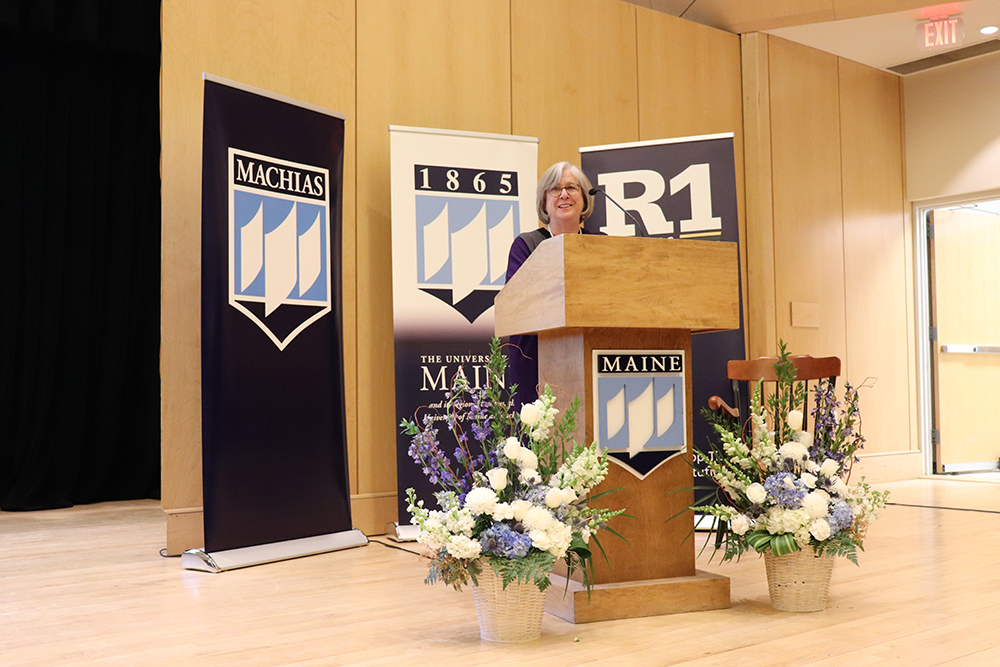On Tuesday, Feb. 28, the University of Maine and University of Maine at Machias President Joan Ferrini-Mundy welcomed faculty, students and community members to the Minsky Recital Hall for the 2023 State of the University Address.
Ferrini-Mundy and other distinguished guest speakers spoke about the recent exciting projects and accomplishments happening around the campus, and also looked forward to the challenges and possibilities that will define the future of the university.
MJ Sedlock, senior lecturer in theater and president of the UMaine Faculty Senate, led the opening remarks of the ceremony. Sedlock praised the interconnected community found at UMaine and UMaine at Machias and expressed how grateful she is to be a part of a culture of growth and success, noting that communities like this “leads faculty, staff, and students to regularly go out of their way to help each other and connect with each other.”
President Ferrini-Mundy then invited Chancellor Dan Malloy to offer his thoughts on the direction the university is heading in as a whole. He acknowledged ongoing challenges UMaine is facing, including those related to demographic and infrastructure as well as the decrease in size of incoming classes.
“[Students and faculty must not] forget about the opportunities that present themselves on a daily, weekly, monthly, yearly basis,” Malloy said. “This is a great university, as is the campus at Machias… We have great faculty, wonderful students, great possibilities in one of the finest states to live in in the nation. Let us take stock of who we are and what we are and what those possibilities mean for us in the short run and in the long run.”
As President Ferrini-Mundy took the stage for her official address, she began by referencing goals she had set for the university at her previous address, including creating a culture of caring. She recognized many of the ways in which UMaine has followed through on making a difference in the last year. Some of these accomplishments include building the world’s first 3D-printed house made entirely of biobased materials, with multiple faculty members receiving state and nationally-recognized awards, the 50th anniversary of the Climate Change Institute and the university’s official Carnegie R1 status in research.
With regards to her goal to achieve a culture of caring, Ferrini-Mundy referenced many initiatives taken by students and staff to promote mental health and community safety and to provide various forms of aid to those in need within the UMaine community and throughout the state. Among many impressive examples the President mentioned was the School of Nursing’s mental-health-based initiative.
“The School of Nursing, with several collaborators, implemented a comprehensive, holistic and inclusive research program called WellNurse to promote resilience and well-being among nursing students, faculty and staff,” Ferrini-Mundy said. “Future nurses cannot provide high-quality, evidence-based care if they neglect their own health and well-being. To date, 106 students, faculty and staff have completed an eight-week evidence-based, mindfulness-based stress reduction program. What an incredible model for all of us.”
Dr. Kody Varahramyan, Vice President for Research and Dean of the Graduate School, then took the stage to discuss the achievements of UMaine’s Graduate School as it celebrates 100 years of advancing education to support local and global workforce and economic development.
Varahramyan invited Katie Ashley, a doctoral student in plant sciences, to describe the experiences she has had since joining the university.
“The University of Maine gave me the opportunity to build on my natural affinity for agriculture regardless of my economic background or lack of family history in academia,” Ashley said. “This emphasis on diversity of students is the true strength and future of UMaine graduate education, and will ensure that invaluable perspectives and ideas are heard.”
Ashley credited UMaine for providing a place for all types of students to be supported and given the opportunity to shine in their academic fields.
After celebrating what has already been achieved, Ferrini-Mundy centered the remainder of her address around what is yet to come. Specifically, she turned attention to the UMaine Compass commitment. Its current focal points are to establish UMaine as the Green Action University and to promote well-being and a sense of belonging across the board. With the many challenges facing UMaine, the leaders of UMaine remain committed to improving all aspects of campus and community life while placing diversity, equity and inclusion at the forefront.
To conclude, Ferrini-Mundy offered her audience a hopeful perspective.
“No matter the challenges, the University of Maine and University of Maine at Machias remain student-focused, with dedicated faculty and staff committed to making a difference. We know that the experience in and out of the classroom that we provide prepares students to define tomorrow. We are caring, compassionate university communities committed to diversity, equity and inclusion. Our research, innovation and public engagement in collaboration with our countless community partners not only defines tomorrow, but also makes a difference in the lives of people in Maine and beyond,” Ferrini-Mundy said.








